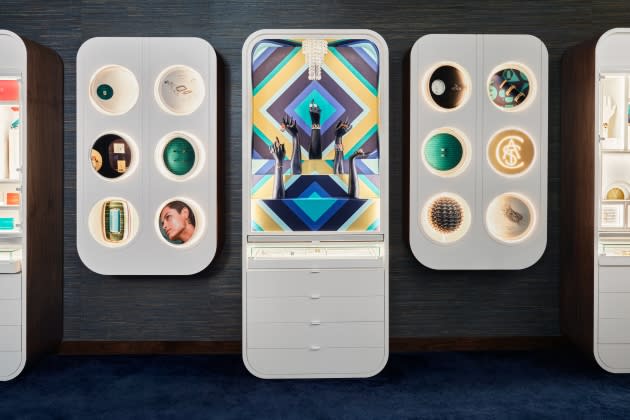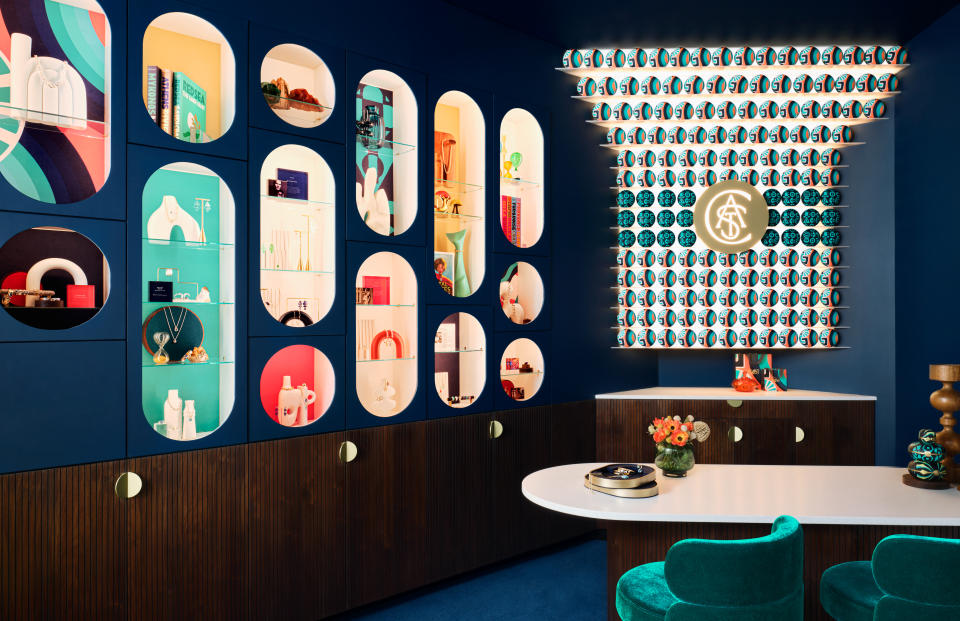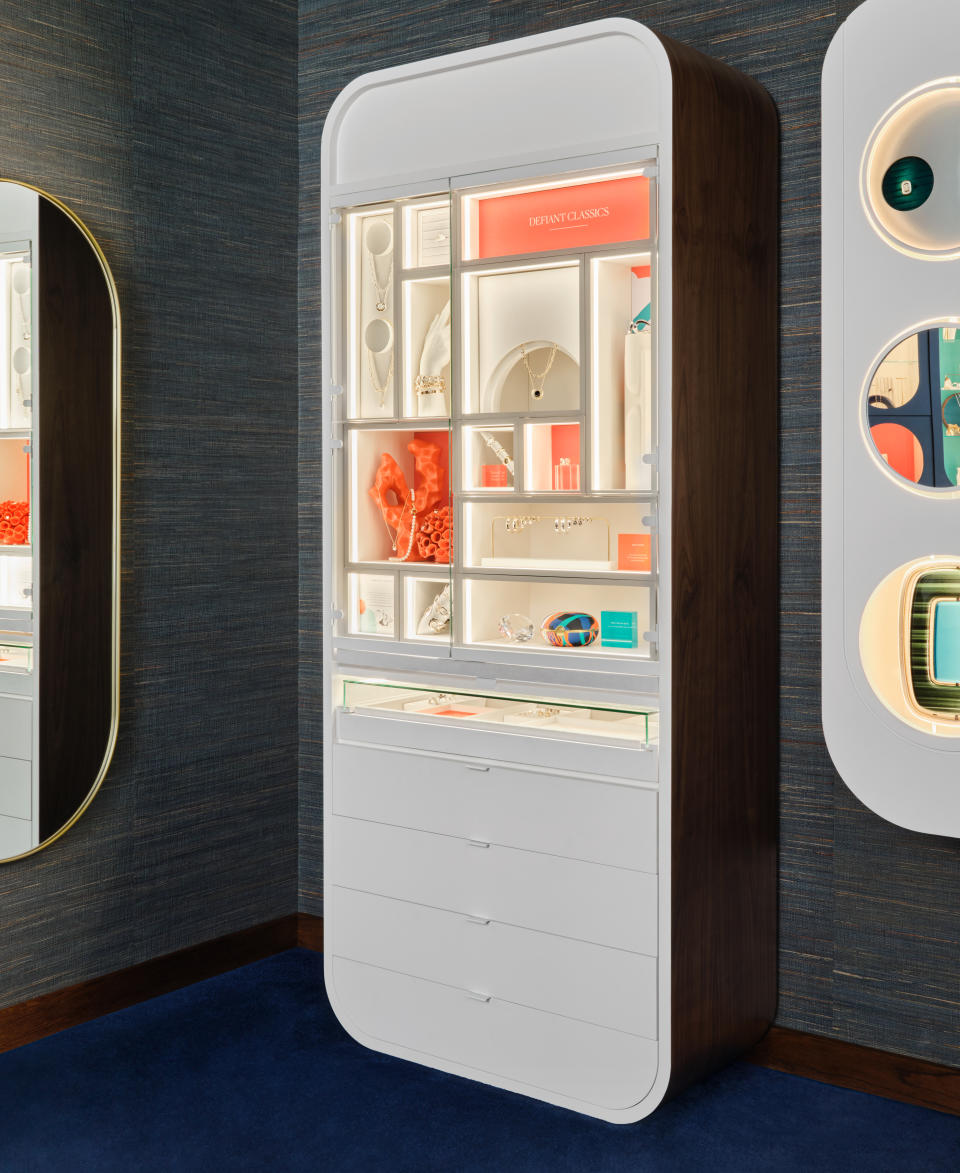Cast’s First Store Wants to Shake Up Fine Jewelry Retail

Walking into a luxury jewelry store shouldn’t feel like an uptight, stuffy experience, according to San Francisco, California-based fine jewelry brand Cast. So for the company’s brick-and-mortar debut this month, cofounders Eric Ryan and Rachel Skelly, the masterminds behind brands like Olly gummy vitamins, did what they do best: They threw out the old model and brought in the fun for their upcoming Corte Madera boutique.
Set to open on Thursday at The Village at Corte Madera at 1536 Redwood Highway, the 500-square-foot, Instagram-worthy store itself is something of a jewel box. Forget sterile spaces and pretentious attitudes. Think jubilant colors, welcoming vibes and people-oriented service, the partners explained in an exclusive interview with WWD.
More from WWD
Cast, which launched online last year, is the brainchild of chief creative officer Skelly, a designer and creative director with years of experience in fashion, food and wellness. The business operates like the antidote to a jewelry industry that often takes itself too seriously, and the inaugural store was designed as the physical embodiment of that ethos.
“As a woman who loves jewelry, and the creativity and artfulness of it, I have never had a place that I felt comfortable shopping in, and I know a lot of my friends feel the same,” she said. “Eric and I really believed that we could do something differently in the space.”

Jewelry is outside Ryan’s expertise but as the friends, who previously worked together at Olly, discussed the opportunity, the conversation tapped into an all-too familiar theme.
“I originally started Method, the soap company, vitamin brand Olly and then Welly Health, which was trying to disrupt the pharmacy OTC [over-the-counter] space with a drug line that just launched at Target. This is different, but also very similar,” he explained. “We like to find categories that we think are ripe for disruption, and we try to figure out what the cultural shift is — like, how can we reframe the experience?”
For the serial entrepreneur, what tipped the scales was one particular revelation: Fine jewelry sales growth is driven by women self-purchasing. Those moments are worth celebrating, yet fine jewelry stores seem more interested in piling on the intimidation instead.
“You ask to look at a piece, and when you ask the price, the world’s smallest price tag gets turned over, and you have to react to that price,” he added. “Everything comes out of a salesperson’s mouth. I’ve never walked out of a jewelry store feeling good about my purchase.”
Now the founders are on a mission to make fine jewelry shopping “feel joyful.”
The venture capital-funded operation caters to the woman who’s coming into her own and transitioning from fake or costume jewelry into finer pieces. The business focuses on female artists such as Kristy Ford, Lauren Harwell Godfrey and others through collaborations and exclusive collections curated by Skelly. The options vary from classic looks and metal work that resembles cable knits to playful or Mod styles, among others.
“We want to build a brand that can continually innovate, stay fresh and offer the aesthetic range for consumers,” Skelly said. “Because the challenge with a lot of traditional luxury brands is they do have a singular aesthetic.” The Corte Madera store will carry the online selection, and area shoppers may even get an advantage. The very latest offerings will likely arrive in store before landing on the website.

Either way, the founders said, customers will know they’re in for a different kind of shopping experience immediately.
“The way we’ve engineered the service model, we didn’t hire salespeople — we hired all stylists,” Ryan added. “And so they’re going to work with you from a stylistic point of view, versus a selling point of view, and that aesthetic range of how you can layer it, how you can pair things together.”
Another difference: People won’t have to suffer through embarrassing price tag inquiries. Shoppers will get a menu of prices upfront to peruse over a De Soi beverage, and trying on jewelry is encouraged. Cast is going for a “kid in a candy store” feeling, but in a “chic meets whimsical” environment that’s appealing for adults. Working with Grow, a women-owned agency in San Francisco, Cast designed the space to offer a literal treasure hunt. There’s even a sensory experience courtesy of 12.29, a parfumerie based in Paris and New York, which created a custom scent for the boutique.
Altogether it rolls up into a branding strategy anchored by Cast’s emerging brick-and-mortar retail. According to Ryan, “performance marketing costs have really become challenging. I think physical retail is a brand temple — it’s one of the best ways to build instant brand credibility.”
Prior to the COVID-19 pandemic the partners wanted to open up shop in San Francisco, where the office is located. They still hope to one day. But timing matters, particularly given the tough retail environment in the city.
San Francisco has gone through major swings in crime in the past couple of years that still stoke violent incidences and property crime. In August and September, robberies were up 5.6 percent year-over-year, while larceny theft, which includes retail theft, grew 4.5 percent. The latter makes for the majority of reported crimes. Residents have seen waves of closures, from mom-and-pop shops to clothing stores like The Gap. Though Gap Inc’s laboratory stores remain open, the ups and downs of retail remain a steep challenge in the city and elsewhere. Just last month, Gap Inc. laid off 500 employees.
Cast still believes in the power of physical retail, but it’s about more than just pushing merch — especially for categories like fine jewelry.
“We think our best customers will come from those who walk into our four walls, but also, it will allow our e-commerce to be much more efficient, as we build stores in markets,” Ryan said. “So we’re super bullish on the role of physical retail going forward, particularly for this industry.”

